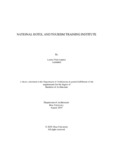| dc.contributor.advisor | Mallick, Fuad H. | |
| dc.contributor.advisor | Reza, Mohammad Habib | |
| dc.contributor.author | Upama, Lamia Wali | |
| dc.date.accessioned | 2019-09-24T05:06:10Z | |
| dc.date.available | 2019-09-24T05:06:10Z | |
| dc.date.copyright | 2019 | |
| dc.date.issued | 2019-08 | |
| dc.identifier.other | ID 14208003 | |
| dc.identifier.uri | http://hdl.handle.net/10361/12758 | |
| dc.description | This thesis is submitted in partial fulfillment of the requirements for the degree of Bachelor of Architecture, 2019. | en_US |
| dc.description | Cataloged from PDF version of thesis. | |
| dc.description | Includes bibliographical references (pages 91-92). | |
| dc.description.abstract | Tourism and hospitality hold a very significant position in the future development of this
country as we are graduating ourselves to the middle-income economy. We have been able to
achieve some maturity in some of the export-oriented industries, along with agriculture.
However, one of the most important, thriving sectors which could really help our economy
improve – ‘tourism and hospitality’ – was long been neglected. It has both local and
international implications and we have not tapped its full potential yet. Through this sector, we
could export skilled hospitality professionals to abroad and also earn foreign remittances. To
sum it up, it can be said that this area still remains as unventured and neglected.
Tourism has been experiencing decline in interest for foreign travelers, whereas in many
developing countries like ours, tourism has played a vital role in the development of those
countries. As this sector is completely service-oriented; therefore, the strategic development of
its tourism products depends upon training the professionals of this sector.
In order to restructure our tourism activities, a training institute for tourism and hospitality
sector that will have adequate training facilities to help in building a career for the new
generation of professionals is required.
The design of the National Hotel and Tourism Training Institute is aimed at creating a
paradigmatic architectural resolution that the country’s policy makers, public representatives
and even the academia including students of architecture would be greatly benefitted from. | en_US |
| dc.description.statementofresponsibility | Lamia Wali Upama | |
| dc.format.extent | 92 pages | |
| dc.language.iso | en | en_US |
| dc.publisher | Brac University | en_US |
| dc.rights | Brac University theses are protected by copyright. They may be viewed from this source for any purpose, but reproduction or distribution in any format is prohibited without written permission. | |
| dc.subject | Tourism | en_US |
| dc.subject | Hospitality | en_US |
| dc.subject | Institute | en_US |
| dc.subject | Hotel | en_US |
| dc.subject | Training | en_US |
| dc.subject.lcsh | Architecture--Design. | |
| dc.subject.lcsh | Hospitality industry. | |
| dc.title | National Hotel and Tourism Training Institute | en_US |
| dc.type | Thesis | en_US |
| dc.contributor.department | Department of Architecture, Brac University | |
| dc.description.degree | B. Architecture | |

